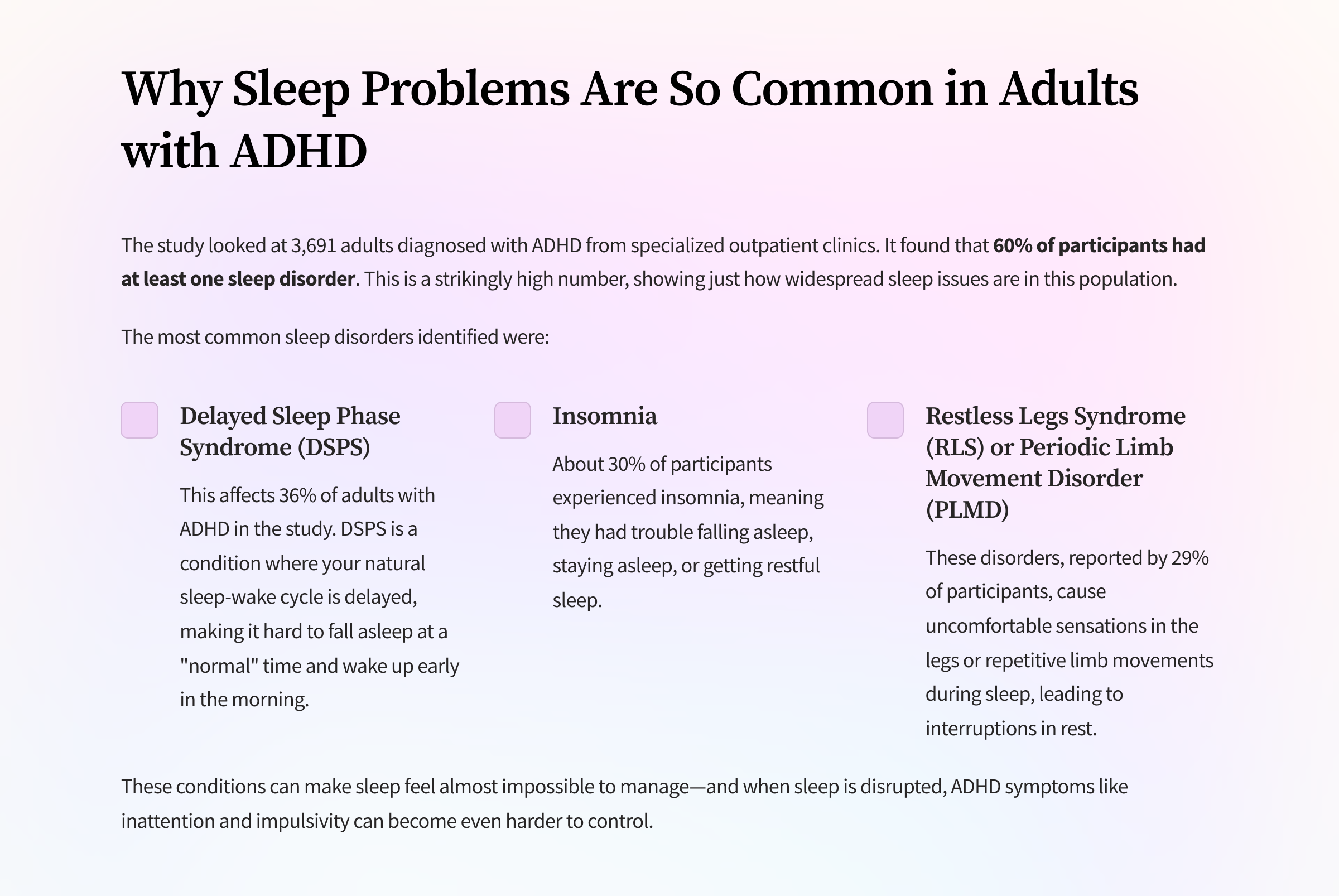New Research on ADHD and Sleep Problems
Sleep Disorders in Adults with ADHD: Understanding the Overlap with Psychiatric Comorbidities
Sleep is one of the most fundamental aspects of our health, but for adults with ADHD, restful sleep can feel like a distant dream. New research on adhd and sleep sheds light on how common sleep problems are in adults with ADHD—and the impact they have on mental health. By understanding these findings, we can take necessary steps toward better sleep, improved ADHD management, and enhanced overall well-being.
If you’ve ever wondered why ADHD and sleep issues seem so intertwined, this article will break it down for you.

What does the New Research on ADHD and Sleep Disorders Say?
A large study published in the Journal of Attention Disorders in 2024 focused on adults with ADHD who were treated in specialized outpatient clinics. The findings are striking:
- 60% of adults with ADHD had at least one sleep disorder.
- The most common sleep disorders were:
- Delayed Sleep Phase Syndrome (DSPS): Found in 36% of participants. DSPS makes it hard to fall asleep and wake up at conventional times because your natural sleep-wake cycle is delayed.
- Insomnia: A persistent difficulty falling or staying asleep, affecting 30% of participants.
- Restless Legs Syndrome (RLS) or Periodic Limb Movement Disorder (PLMD): These conditions, experienced by 29% of participants, cause leg discomfort or movements during sleep, disrupting rest.
These findings emphasize how prevalent sleep problems are for adults with ADHD. Sleep challenges aren’t just a minor inconvenience—they can profoundly affect your daily life, mental health, and ability to manage ADHD symptoms.
The ADHD-Sleep-Mental Health Connection
The study didn’t stop at identifying sleep disorders—it also examined their link to mental health conditions. Adults with ADHD who struggled with sleep were significantly more likely to have psychiatric comorbidities, including:
- Depression
- Anxiety disorders
- Substance use disorders
- Personality disorders
- Post-Traumatic Stress Disorder (PTSD)
For example, individuals with ADHD and PTSD were over three times more likely to develop a sleep disorder.
A Bidirectional Relationship
This research highlights a two-way connection between ADHD, sleep, and mental health:
- Sleep problems can worsen ADHD symptoms, such as inattention, impulsivity, and emotional dysregulation.
- ADHD symptoms can make it harder to fall asleep or stay asleep, creating a vicious cycle.
- Both ADHD and sleep disorders can intensify mental health challenges like depression or anxiety.
This cycle underscores the importance of addressing ADHD, sleep issues, and mental health together for better outcomes.
The Importance of Screening for Sleep Problems in ADHD
One of the most practical findings of this new research is the critical need for sleep disorder screening in ADHD treatment. Sleep issues often go undiagnosed, yet they can have a significant impact on your energy levels, focus, and mood.
In this study, researchers used the Holland Sleep Disorders Questionnaire (HSDQ), which screens for a variety of sleep disorders, including:
- Insomnia
- Circadian Rhythm Sleep Disorders (e.g., DSPS)
- Restless Legs Syndrome (RLS)
- Parasomnia (like sleepwalking or night terrors)
- Sleep-related breathing disorders (e.g., sleep apnea)
By identifying sleep problems early, healthcare providers can develop targeted treatments that address not only ADHD symptoms but also the sleep challenges that often accompany them.
What Does This Mean for Treatment?
This research highlights the value of a holistic, integrated approach to treatment. Managing ADHD effectively means treating the sleep and mental health challenges that often come with it.
Here are some strategies that could help:
1. Cognitive Behavioral Therapy for Insomnia (CBT-I):
This evidence-based therapy can help retrain your brain to overcome insomnia by developing healthier sleep patterns and routines.
2. Circadian Rhythm Management:
For those with DSPS, targeted strategies like light therapy, melatonin supplementation, or gradually adjusting your sleep schedule can help regulate your natural sleep-wake cycle.
3. Medication Adjustments:
Some ADHD medications, especially stimulants, can interfere with sleep. Working with your doctor to adjust medication timing or dosage can make a significant difference.
4. Relaxation and Sleep Hygiene:
Creating a bedtime routine, limiting screen time before bed, and practicing relaxation techniques like deep breathing or meditation can set the stage for better sleep.
5. Multidisciplinary Care:
Because ADHD, sleep disorders, and mental health issues are so interconnected, it’s essential to work with a team of specialists. This might include a primary care doctor, psychiatrist, sleep specialist, or therapist.
Strengths and Limitations of the Study
This study stands out for its large sample size of nearly 4,000 adults with ADHD and its use of validated screening tools like the HSDQ and M.I.N.I. Plus (a diagnostic tool for mental health conditions).
However, there are a few limitations to consider:
- The study relied on screening questionnaires, not diagnostic tools like overnight sleep studies, which may overestimate the prevalence of some sleep disorders.
- It didn’t track participants over time, so we don’t know the exact cause-and-effect relationships between ADHD, sleep problems, and mental health.
- Since the study was conducted in specialized ADHD clinics, the results may not apply to all adults with ADHD.
Despite these limitations, the findings highlight an urgent need for more research on ADHD and sleep—and for more attention to sleep problems in clinical practice.
What You Can Do Today
If you’re struggling with both ADHD and sleep problems, this new research offers hope. It shows that you’re not alone, and there are clear steps you can take to improve your situation.
Start by asking yourself these questions:
- How often do I wake up feeling rested?
- Are my sleep issues making my ADHD symptoms or mental health challenges worse?
- Have I talked to my doctor about screening for sleep disorders?
Final Thoughts on ADHD and Sleep
This new research on adhd and sleep highlights the deep connection between ADHD, sleep problems, and mental health. By addressing all three together, we can break the cycle of poor sleep, worsening ADHD symptoms, and mental health struggles.
Remember: sleep isn’t just a luxury—it’s a cornerstone of your health and well-being. If you’re struggling, don’t hesitate to contact a healthcare professional who can help you explore integrated treatment options.
With the proper support, a good night’s sleep might not be as far away as it feels.
More Pages on Sleep
REvenge Bedtime Procratination
References
You can read about this study here
Citation:
van der Ham, M., Bijlenga, D., Böhmer, M., Beekman, A.T.F., & Kooij, S. (2024). Sleep problems in adults with ADHD: Prevalences and their relationship with psychiatric comorbidity. Journal of Attention Disorders, 28(13), 1642-1652.
This comprehensive study highlights the intricate relationship between sleep disturbances and psychiatric comorbidities in adults with ADHD, emphasizing the importance of thorough assessments and tailored interventions.



